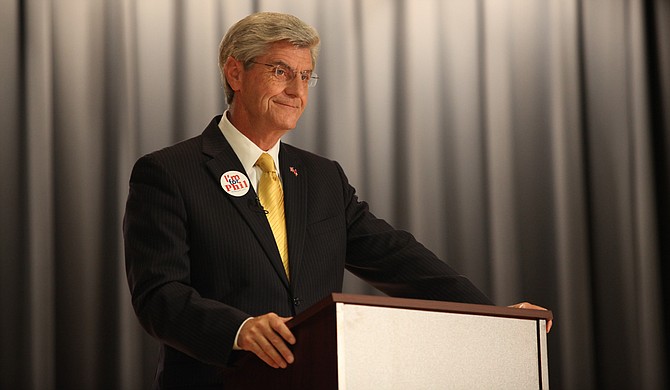It's hard to believe any of this wouldn't have happened if Gov. Phil Bryant had intervened in November to try to redirect the search toward candidates with less conventional academic credentials, saying he wanted more focus on workforce development. Photo courtesy Amile Wilson
JACKSON, Miss. (AP) — Mississippi's Community College Board should be thankful that the state's College Board got crossways with University of Mississippi Chancellor Dan Jones.
Without the dispute over Jones leaving Ole Miss to distract them, more members of the general public might have noticed the train wreck on the board that coordinates the state's 15 community and junior colleges.
It's at least as bad as what's happened at the universities, and maybe worse. Since December, the 10-member board has been locked in a 5-5 stalemate over who should be hired as the board's next executive director. Last week, the trench warfare claimed Debra West, the board's deputy director of programs and accountability, who had been the favored candidate of one of the five-member factions. The other group wanted to reopen the search to look for someone else.
West withdrew her candidacy. That's likely to clear the way for a new search, although there are still questions about whether the board can function effectively, or how attractive the job might be considering the deep divisions created by months of behind-the-scenes maneuvering.
Like the College Board, Community College Board members are trying to leave all the talking to their chairman, Bruce Martin, who has voted on the governor's side. That makes it hard for the public to know what other board members are thinking. It would be interesting to know, for example, what the other five members think of Martin's plan to have former Mississippi State University President Malcolm Portera run a new search for an executive director. But in a triumph of bravery and accountability, seven of the 10 board members have never returned a phone call from The Associated Press.
There's plenty of blame to go around. It's hard to believe any of this wouldn't have happened if Gov. Phil Bryant had intervened in November to try to redirect the search toward candidates with less conventional academic credentials, saying he wanted more focus on workforce development.
Martin finally acknowledged last week what insiders have been whispering about for months—that Bryant asked the board to consider hiring Tray Hairston, a lawyer who was Bryant's policy adviser for the first 18 months of his term. Hairston now works for the Butler Snow law firm, which doubles as a holding pen for former and future officials in Republican administrations, including former Gov. Haley Barbour.
After the community college presidents rose up to defend the requirement that the executive director should have administrative experience at an academic institution, Bryant has backed off publicly.
"The governor has every confidence in the board and believes they will make the best decision in their search for an executive director," spokeswoman Nicole Webb said last week.
Unlike at the university level, the Community College Board doesn't run the colleges directly. They're run by boards appointed by local governments in each college's district. But one of the executive director's main jobs is to lobby lawmakers for funding. And in that way, the struggle may already be affecting the 76,000 students of the 15 colleges.
Johnny Allen, the outgoing president of Northeast Mississippi Community College and the Mississippi Association of Community and Junior Colleges, said he believes the executive director struggle hurt the colleges as they were trying to win more funding from lawmakers in this year's Legislature. Lawmakers gave about a $9 million increase to the colleges, which did little to lift them toward their legally mandated support level—an amount halfway between what K-12 and universities get per student.
"Certainly, I think for the next year, the colleges are going to suffer some financial consequences," Allen said.
Copyright Associated Press. All rights reserved. This material may not be published, broadcast, rewritten, or redistributed.



Comments
Use the comment form below to begin a discussion about this content.